

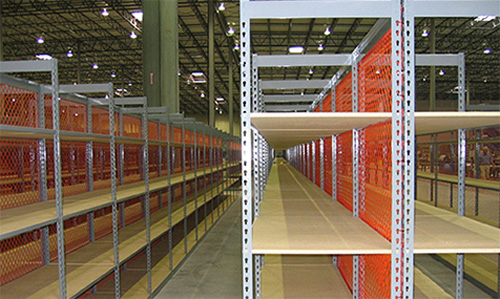
Rivet shelving is one of the most versatile forms of industrial shelving available. With individual shelf capacities up to 1,400 pounds, it rivals the load capacity of heavy wide span or pallet rack but is designed for carton and case storage. It assembles quickly due to its tear-drop and pin connectors and is extremely sturdy whether using a single-rivet or double-rivet design. It’s also available in an amazing array of sizes and layouts.
Read the rest of this entry »
Tags: storage, rivet shelving, Penco, Western Pacific Storage Solutions, carton
Posted in Storage, Organization & Workstations|
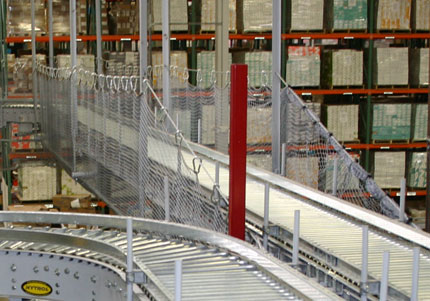
Conveyors are often installed overhead or suspended from the ceiling to help conserve floor space or to interface with mezzanines or platforms. This may create potential fall hazards. Loads can fall from inclined conveyors as they are conveyed up or down, or be subject to other factors that can cause a fall from an elevated line. Even on a floor-mounted conveyor, a spill can split a case, land on an order pickers’ toes, or damage inventory.
Read the rest of this entry »
Tags: Belt Conveyors, guard rails, conveyor safety, fall protection
Posted in Conveyor Optimization|
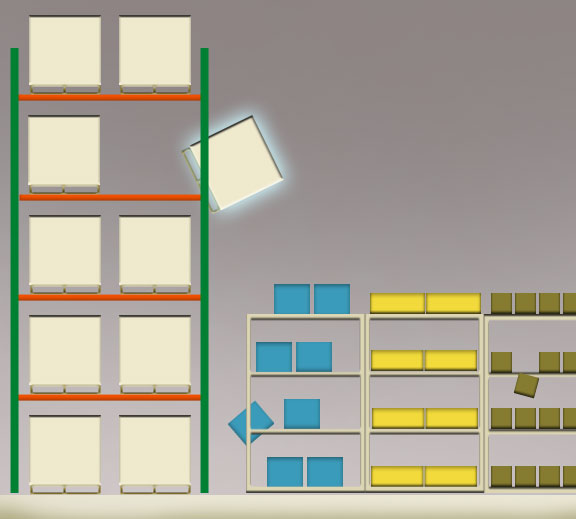
What goes up…
In warehousing and storage operations where inventory is stored high on racks, stacked on floors, slotted into on multi-level shelving, mezzanine deck-overs or on suspended/overhead conveyor as it moves, there is one constant: things will fall. They fall because they’re stacked wrong. They fall because an order picker or a forklift bumps them. Things fall due to seismic activity, machine stops, or silly mistakes. Sometimes it seems like they fall for no reason at all.
What can you do to “stop the drop”?
Read the rest of this entry »
Tags: Inventory protection, product damage, conveyor safety, warehouse control
Posted in Safety & Ergonomics|
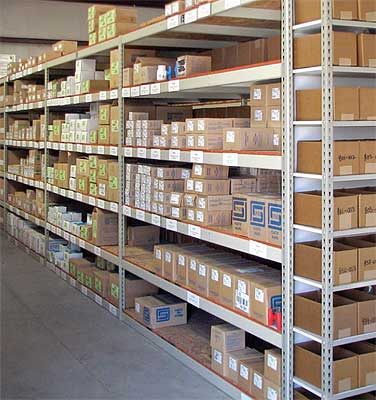
It’s common to store large amounts of inventory on
industrial shelving. The diversity of that inventory—bins full of parts, boxes of varying weights and other odd loads—can contribute to the dangers of falling product. Shelves are accessed frequently and by a variety of people, meaning that every time they are loaded, unloaded, picked or bumped, a spill could happen. A falling shelf load could cause worker injuries and of course ruin your inventory. What can you do about it?
Read the rest of this entry »
Tags: warehousing, shelving, plant safety, Inventory protection
Posted in Storage, Organization & Workstations|
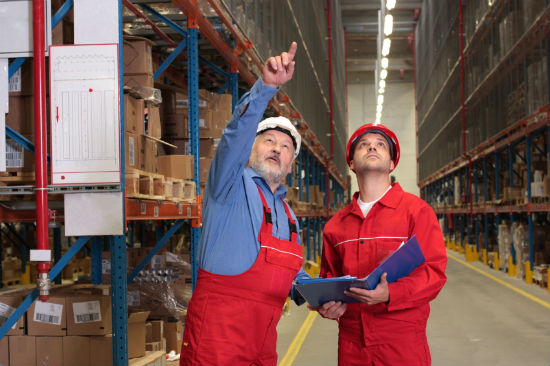
Industrial workplace safety bears repetition and consistent reinforcement
For manufacturing and distribution operations, workplace safety doesn’t just protect workers—it optimizes productivity and helps drive revenue growth. It also helps protect company assets, reduces downtime, and increases morale. What can you do to protect your employees in picking, packing, material handling, assembly, maintenance and similar work? To answer this question, we spoke with leading manufacturers and distributors. Here’s what they had to say: Read the rest of this entry »
Tags: Hytrol, industrial safety, Unex, ergonomics, WireCrafters
Posted in Safety & Ergonomics|
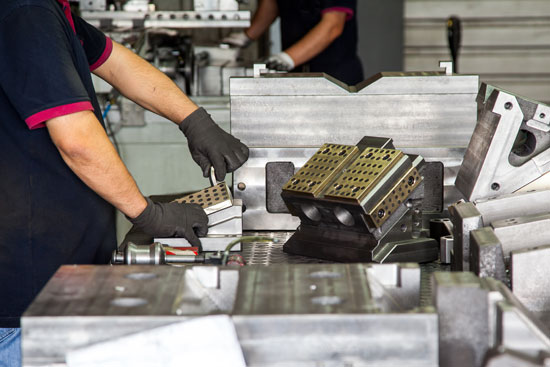
Waste might be the most critical measure for manufacturing operations – waste of labor, materials, time and money. Many companies are faced with nearly constant pressure to cut costs and increase efficiency, even as demand spikes. This means reducing costs without compromising quality or throughput. What are some things you can do to balance these needs?
Read the rest of this entry »
Tags: lean manufacturing, ROI, Cost Reduction, assembly, cost-of-goods
Posted in Manufacturing|
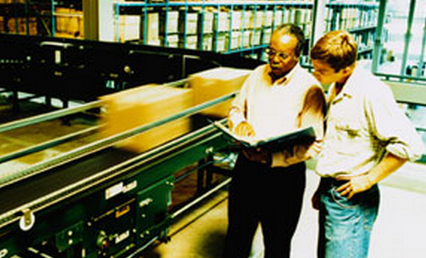
Your conveyors are the unsung hero of your facility, delivering product quickly and efficiently at the push of a button (or automatically in many cases) where it’s needed, when it’s needed. Most people don’t think about their conveyors and automated equipment much, but if it breaks down, you suddenly can’t think of much else. You simply can’t afford downtime when material handling equipment is delivering your core business.
Read the rest of this entry »
Tags: Conveyor, service, conveyor maintenance, repairs
Posted in Conveyor Optimization|

Do areas of your facility require constant temperatures? Are your employees dealing with significant seasonal temperature variations? These situations all require special conditions – often conditions that are hard to control with people and equipment moving in and out all the time. Let’s examine some climate control options outside the world of HVAC equipment.
Read the rest of this entry »
Tags: cooling, fans, high-speed doors, mesh door, HVLS, high volume low speed, high velocity, industrial fan, climate control, air circulation, destratification, ventilation, heating, work environment
Posted in Safety & Ergonomics|
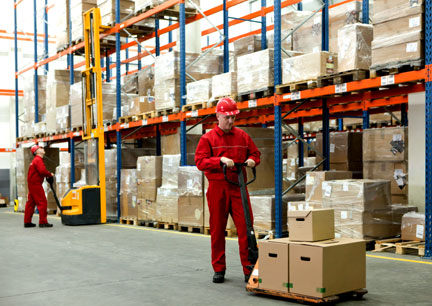
Scene: a typical, busy warehouse
A fulfillment center with row upon row of pallet racks. Eight dock doors occupy one wall of the building, some for receiving, some for shipping. Pick workers work in the rack aisles pushing carts and pallet jacks loaded with picked orders. Other pick workers have empty totes on carts for pulling orders. Fork trucks stock pallet rack and pull bulk stock for large orders. Dock doors are left open much of the time, even when there’s no trailer at the dock.
How many potential safety risks can you envision in this scenario? How do you prevent those from happening?
Read the rest of this entry »
Tags: safety sensors, motion detection, infrared, technology
Posted in Safety & Ergonomics|
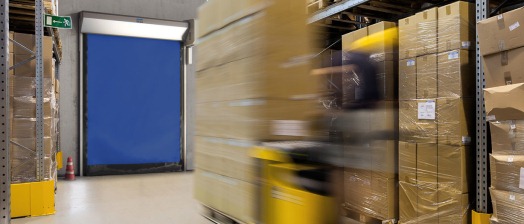
Somewhere in your facility, there may be a place where someone frequently shouts “shut the door!”
Perhaps you have operations that require maintaining temperatures within certain limits. There may also be areas heavy-traffic areas where a conventional overhead door’s slow lift and close rates cause delays, slower throughput and cause reduced productivity from waiting on a door to open.
These are situations where a high-speed door may solve a variety of problems. From limiting airborne debris, dust and contaminant infiltration to temperature regulation, high-speed doors pick up the pace in your facility even as they limit the amount of exposure to negative environmental influences. They open and close so quickly that forklifts and people hardly need wait on the door in order to pass through the doorway. Let’s take a few minutes to explore the types and key features of high-speed doors.
Read the rest of this entry »
Tags: collision, forklift, high-speed door, vinyl mesh door, aluminum frame, steel frame, stainless steel frame, self-repair
Posted in Docks & Shipping|
Read our customer reviews













